Photojournalist
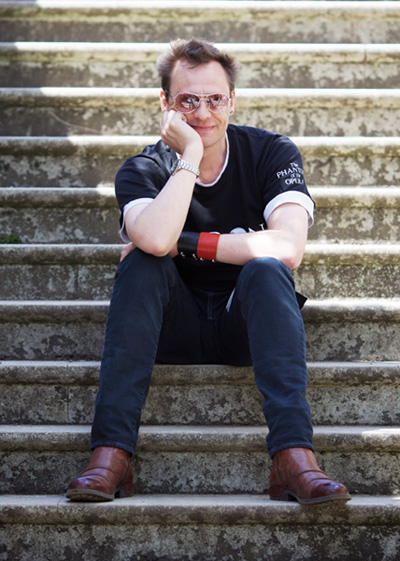 Prior to becoming a writer I was a professional photojournalist. I studied photography in London and had many years experience in the field of photography. My fastidious eye for detail led to my being commissioned by many leading global companies.
Prior to becoming a writer I was a professional photojournalist. I studied photography in London and had many years experience in the field of photography. My fastidious eye for detail led to my being commissioned by many leading global companies.
I specialised in photojournalism, editorial, fashion, beauty and product photography, though having started out as a press photographer I had a passion for photojournalism, especially the investigative journalism side.
I first got into photography when I was 10 years old. Back then I was a budding ornithologist and spent many hours photographing birds. I was 16 when I bought my first 35mm SLR camera, a Fujica STX-1n, which I soon grew out of when I discovered the optical limitations of its screw-in lenses. After much research (magazines and asking Fleet Street press photographers what cameras they used - there was no internet back then) I bought a Nikon FM2, and later an F3, so I could benefit from the superb optical quality of Nikon's lenses. My Nikon F3 coupled with a Nikkor 300mm F2.8 lens was a combo I loved working with, especially while sitting along the touchlines at Highbury and White Heart Lane with the other press photographers while shooting football matches for two north London newspapers. My Nikon 35mm film cameras and many Nikkor lenses were also my preferred choice for photojournalism work and magazine editorial pieces.
For studio and commercial work I favoured Mamiya RZ67 Pro II and Hasselblad 500cm medium format cameras. Although I preferred the 6x7 format of my Mamiya RZ67 (especially the cool rotating back), I felt that the Carl Zeiss Planar T star lenses on the Hassleblad produced slightly sharper images. The fact that Victor Hasselblad was born on the same day (8th March) as me - be it 60 years earlier – was another reason for my love affair with Hasselblad cameras.
I devoured many books on photography and lighting and later studied photography at college in London. I have a natural eye for a good picture, especially with regard to composition, angle, leading lines and lighting. I’ve always said that there are four vital ingredients required to make up a good photograph: subject matter, lighting, composition and a large helping of creativity.
In my late teens and early twenties I covered several news stories for local newspapers in north London where I wrote up the articles and shot the accompanying photographs. After spending a year working for two photographic retail companies (Campkins and Jessops) and a year in the hire department at The Flash Centre (Elinchrom flash lighting UK Distributor) in London I eventually set up my own photographic studio in north London specialising in commercial, product photography, editorial, fashion and portraiture.
These days I feel that the art of investigative journalism has all but died. For me, BBC news, Sky news, and most other mainstream media, and their journalists are nothing more than a propaganda arm of the government, a vehicle for the government to distribute its press releases – there is no investigative journalism whatsoever, just a so-called news reporter verbalising a re-hashed press release handed to them by their bosses. The ownership and governance of most mainstream media has been brought inside the pillars of the state, all but eliminating the supposed ‘freedom of press’. Today’s so-called news stories follow a barrage of the same old nothingness over a quick newsflash of the day, never actually exploring the roots with good old-fashioned investigative journalism to ascertain the actual ‘truth’, before flipping on to the next headline.
I have scant regard for modern mainstream media journalists as, from what I can gather, most of them have been duped in the same hypnotic trance as the mainstream of the public. If this were not the case why do they keep regurgitating the messages of their employers and the state? The latter so-called news pieces often loaded with ‘nudge theory’ influence to keep the masses in their place and to ‘nudge’ their thought processes in whatever direction the government dictates. In my opinion there hasn’t been a decent investigative journalist since the days of Roger Cook, especially in his BBC television programme, The Cook Report, where he was described as ‘The bravest/most beaten-up journalist in Britain’.
To view Nigel's photographic work click here
Some of my favourite photographers:
Bob Carlos Clarke, Patrick Lichfield, Terence Donovan, David Bailey, Beverley Goodway and Ansel Adams from years gone by and more recently I love the work and style of Karl Taylor and Rosella Vanon.
Favourite quotes from photographers:
“You don’t make a photograph just with a camera. You bring to the act of photography all the pictures you have seen, the books you have read, the music you have heard, the people you have loved.” ~ Ansel Adams
“It’s one thing to make a picture of what a person looks like, it’s another thing to make a portrait of who they are.” ~ Paul Caponigro
“When people ask me what equipment I use, I tell them my eyes.” ~ Anonymous
“One doesn’t stop seeing. One doesn’t stop framing. It doesn’t turn off and turn on. It’s on all the time.” ~ Annie Leibovitz
“Look and think before opening the shutter. The heart and mind are the true lens of the camera.” ~ Yousuf Karsh
In answer to this statement from a local history book writer, who said to my cousin, a photographer. “You take fantastic pictures, you must have a great camera” to which my cousin replied, “Thanks, and you write great books, you must have a wonderful pen.” ~ Robin Cooper
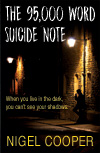 The 95,000 Word Suicide Note is available in paperback and kindle formats.
The 95,000 Word Suicide Note is available in paperback and kindle formats.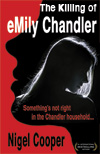 The Killing of Emily Chandler is available in paperback and kindle formats.
The Killing of Emily Chandler is available in paperback and kindle formats.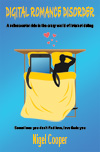 Digital Romance Disorder is available in paperback and kindle formats.
Digital Romance Disorder is available in paperback and kindle formats.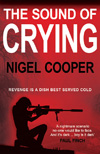 The Sound Of Crying is available in paperback and kindle formats.
The Sound Of Crying is available in paperback and kindle formats.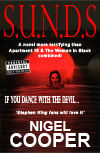 SUNDS is available in paperback and kindle formats.
SUNDS is available in paperback and kindle formats.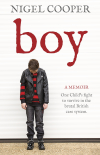 Boy is available in paperback and kindle formats.
Boy is available in paperback and kindle formats.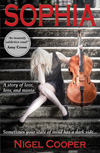 Sophia is available in paperback and kindle formats.
Sophia is available in paperback and kindle formats.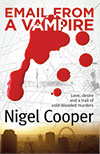 Email From A Vampire is available in paperback and kindle formats.
Email From A Vampire is available in paperback and kindle formats.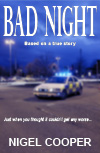 Bad Night is available for kindle on Amazon.
Bad Night is available for kindle on Amazon.